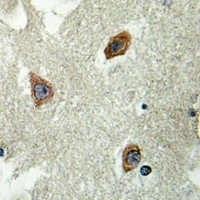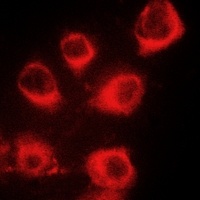You have no items in your shopping cart.
Anti-MYL9 (Phospho-S20) Antibody
Catalog Number: orb214099
| Catalog Number | orb214099 |
|---|---|
| Category | Antibodies |
| Description | Rabbit polyclonal antibody to MYL9 |
| Species/Host | Rabbit |
| Clonality | Polyclonal |
| Tested applications | IF, IH, WB |
| Reactivity | Human, Mouse, Porcine |
| Immunogen | KLH-conjugated synthetic phosphopeptide corresponding to residues surrounding S20 of human MYL9 protein. The exact sequence is proprietary. |
| Antibody Type | Primary Antibody |
| Dilution range | WB: 1-500-1-1000 |
| Form/Appearance | Liquid in 0.42% Potassium phosphate, 0.87% Sodium chloride, pH 7.3, 30% glycerol, and 0.01% sodium azide. |
| Conjugation | Unconjugated |
| Target | MYL9 |
| Entrez | 98932, 10398 |
| UniProt ID | Q9CQ19, P24844 |
| Source | Rabbit |
| Storage | Maintain refrigerated at 2-8°C for up to 2 weeks. For long term storage store at -20°C in small aliquots to prevent freeze-thaw cycles. |
| Buffer/Preservatives | Liquid in 0.42% Potassium phosphate, 0.87% Sodium chloride, pH 7.3, 30% glycerol, and 0.01% sodium azide. |
| Alternative names | anti MLC2 antibody, anti MRLC1 antibody, anti MYRL Read more... |
| Note | For research use only |
| Expiration Date | 12 months from date of receipt. |

Western blot analysis of MYL9 (Phospho-S20) expression in human ventricle (A) whole cell lysates. (Predicted band size: 19 kD; Observed band size: 20 kD)

Immunohistochemical analysis of MYL9 (Phospho-S20) staining in human brain formalin fixed paraffin embedded tissue section. The section was pre-treated using heat mediated antigen retrieval with sodium citrate buffer (Phospho-H 6.0). The section was then incubated with the antibody at room temperature and detected using an HRP conjugated compact polymer system. DAB was used as the chromogen. The section was then counterstained with haematoxylin and mounted with DPX.

Immunofluorescent analysis of MYL9 (Phospho-S20) staining in HUVEC cells. Formalin-fixed cells were permeabilized with 0.1% Triton X-100 in TBS for 5-10 minutes and blocked with 3% BSA-PBS for 30 minutes at room temperature. Cells were probed with the primary antibody in 3% BSA-PBS and incubated overnight at 4 °C in a humidified chamber. Cells were washed with PBST and incubated with a AF594-conjugated secondary antibody (red) in PBS at room temperature in the dark.


